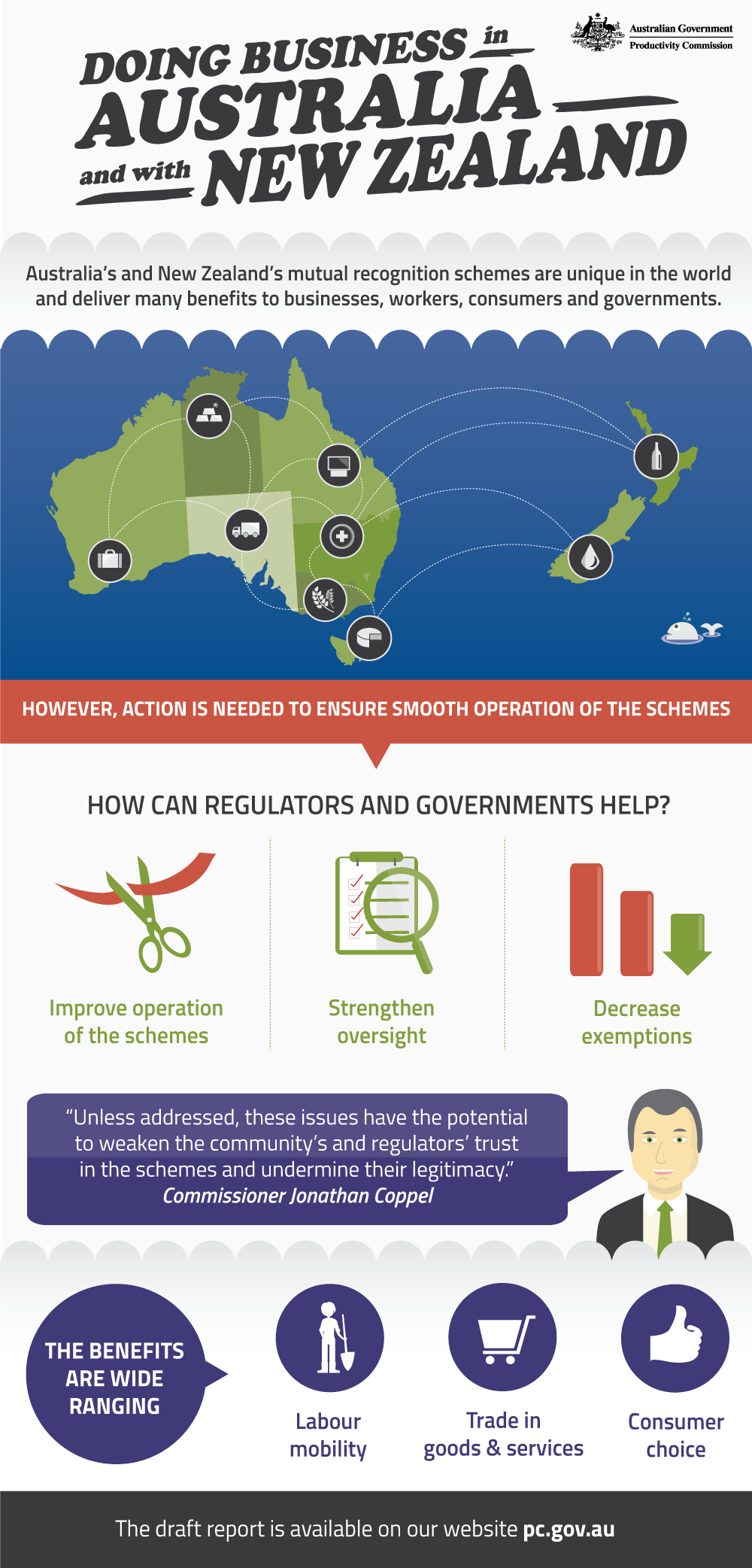Mutual recognition schemes
Draft report
The draft report proposed recommendations aimed at fixing irritants to the smooth operation of the schemes, expanding their coverage and improving their governance arrangements.
You were invited to examine the draft report and to make written submissions by 24 July 2015.
Please note: This draft report is for research purposes only. For final outcomes of this study refer to the research report.
Download the draft report
Key Points
- The Mutual Recognition Agreement (MRA) and Trans-Tasman Mutual Recognition Arrangement (TTMRA) are generally working well. The benefits include making it easier to do business across borders and a wider range of goods and services.
- However, the value of the schemes risks slowly being eroded due to regulators not always implementing mutual recognition as required, weak oversight, and an increase in the number of goods and related laws permanently kept outside the scope of the schemes.
- There are specific concerns with the operation of mutual recognition of occupations relating to 'shopping and hopping', continuing professional development, background checks and determining occupational equivalence. These issues have the potential to weaken the community's and regulators' trust in the schemes and undermine their legitimacy.
- This review has therefore focused on improving governance arrangements, potentially expanding coverage, and addressing irritants to the smooth operation of the schemes.
- The Commission proposes to reform the governance arrangements by:
- strengthening the cross-jurisdictional group of officials responsible for publicising, overseeing and coordinating the schemes, including by giving it more specific responsibilities, time frames, outputs and reporting arrangements
- improving regulator accountability in individual jurisdictions, including by setting clear expectations and annual reporting on mutual recognition matters.
- The Commission proposes the following to improve the operation of the schemes.
- Where there are legitimate concerns about shopping and hopping, governments should make better use of existing mechanisms to address them, such as referring a jurisdiction's registration requirements to a COAG Ministerial Council for consideration.
- Governments should reduce ambiguity about the schemes' scope by clearly stating that mutual recognition applies to legislation-based occupation registration regardless of whether it is administered by a government or non-government body, and that continuing professional development can be required for all persons renewing their occupational registration, including those previously registered under mutual recognition.
- Registration bodies should be able to continue to conduct their own background checks on people seeking registration under mutual recognition.
- The Commission proposes to expand the coverage of the schemes in a few areas.
- There is scope to narrow TTMRA permanent exemptions for road vehicles and hazardous substances, industrial chemicals and dangerous goods.
- The Commission is seeking further information on whether mutual recognition should be extended to state business registration requirements, such as for electrical contractors.
- However, other areas currently outside the scope of the schemes - including laws on the use of goods and the manner of carrying on an occupation - should remain so.
- There would be benefits from allowing licensed professions to provide services beyond their home jurisdiction without having to register again under mutual recognition. But this approach - known as automatic mutual recognition - has some practical challenges, and so a staged implementation is preferred, starting with professions where standards are similar across jurisdictions and the profession is large and mobile.
- The period between formal reviews of the schemes should be increased to ten years.


